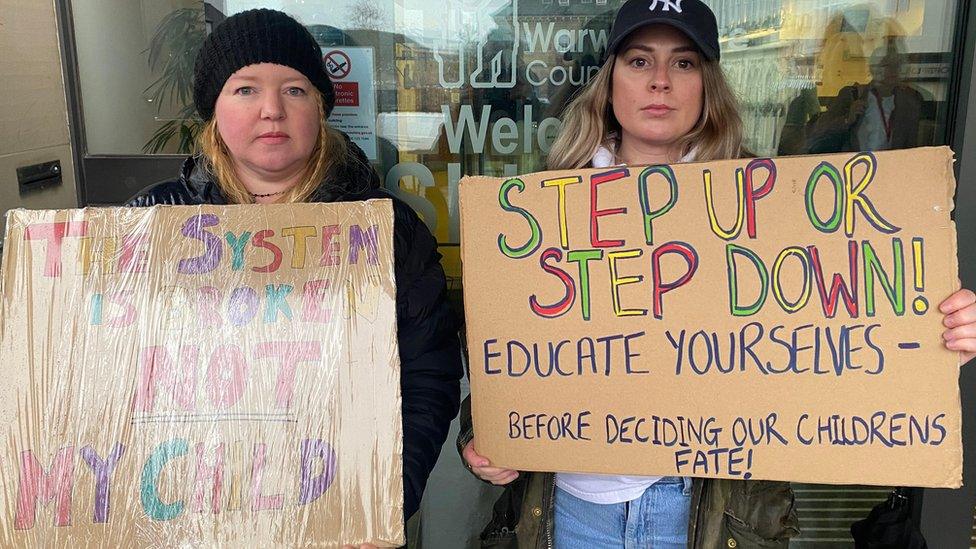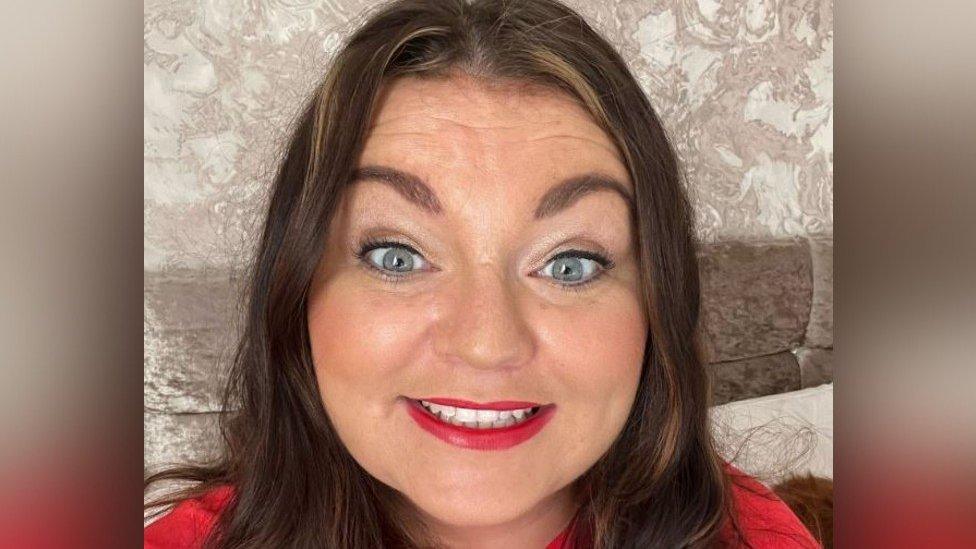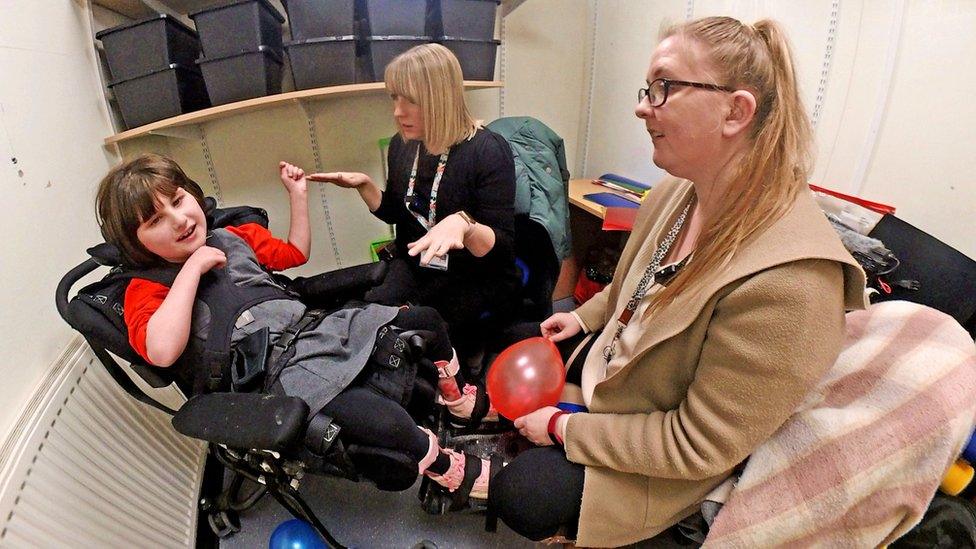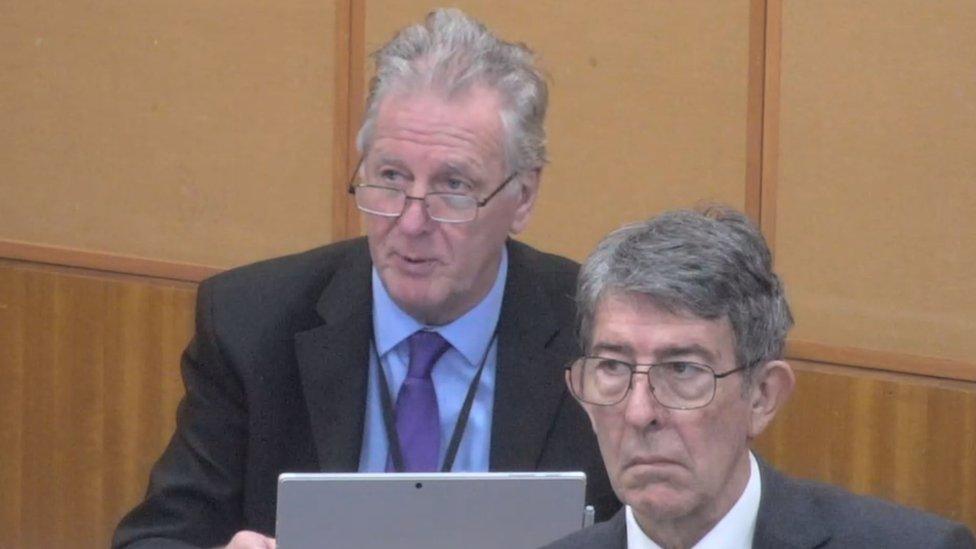Warwickshire special needs row: 'Our children aren't naughty - they're neurodiverse'
- Published

Holistic therapist Joanne and daughter Freya, 11, who has a rare neurological condition
Three councillors in Warwickshire came under fire this week over comments about increasing special needs demand. People with experience of neurodiversity explain their outrage and put forward reasons behind the growing numbers.
It started as a discussion about how to curtail a £17m overspend on the high needs of children in the county over the past financial year.
But suggestions at the meeting - which was filmed - about why there were so many children presenting with special educational needs and disabilities (SEND) led to fury, a demonstration and calls for resignations.
Parents and campaigners were incensed by comments such as not "automatically" accepting a child had ADHD when they were just "really badly behaved", how parents had been swapping tips on how to get their children diagnosed on social media and one councillor musing whether "something in the water" was leading to increased need
Joanne, 49, from Rugby, said her "heart broke" when she heard what was said at Warwickshire County Council.
"Nobody would ever wish for their child to struggle in the way that Freya struggles," she said of her daughter, 11.
Councillors Jeff Morgan, Brian Hammersley and Clare Golby issued apologies over their comments and said they regretted causing offence.
But Joanne has joined other voices, including MP Matt Western, calling for the officials' removal.
"I do everything to ensure [Freya's] life is enriched with experiences and these people hold a narrative that we are just allowing our children to be naughty," she said.
Parenting course
Freya, 11, has a rare neurological condition called agenisis of the corpus callosum, external, which presents as autism and global developmental delay.
Before Freya was diagnosed, her mother recalled council support workers advising her to complete a parenting course.
"She would scream non-stop - she would head bang and she was undoing her nappy. Things were really bad," she said.
"I remember sitting in my living room and crying. Nobody was believing there was anything wrong."

Furious parents protested over the "out-dated" and "offensive" comments
When Freya started school Joanne applied for an Education, Health and Care Plan (EHCP), but Warwickshire County Council pushed back, she said, citing "too many children, not enough provision, not enough money".
After a two-year fight the EHCP was granted, but Joanne said she now home-schooled Freya because her needs had not been met.
She saw parents of SEND children sharing advice on social media as a positive thing, adding that it was a way to "speak to each other, to seek help and understanding, which they haven't received from local education authorities and schools and outreach support".
'Poor management'
Joanne had little sympathy for the council's £17.5m overspend on its high needs budget this financial year.
"I think it's poor management and poor admin - I think they are spending the money but they are not spending the money to the advantage of children that need it," she said.

More than 1.5m pupils in England have SEND, according to government figures, external
About 389,000 (4.3%) have an EHCP
The number of students with an EHCP has increased by almost two thirds since 2016
In Warwickshire, there are 15,575 pupils (17.4%) with SEND in state-funded schools
About 6,000 youngsters in Warwickshire have an EHCP, a 37% increase over the last five years
Coventry and Warwickshire Partnership NHS Trust said some people were waiting over three years for ADHD assessments due to "unprecedented demand"
Average autism wait to assessment times are currently 48 weeks, the service said

Hartshill councillor Katie Hobley says elected officials deserve "scrutiny"
Katie Hobley, 34, a North Warwickshire Borough councillor, was diagnosed with ADHD and dyslexia when she was 16.
"I've always struggled just to sit down and to be quiet," she said. "I'm a councillor, a football coach, I have four children - I have to be busy all the day."
She considered herself lucky to be diagnosed because "it wasn't the done thing then".
"It's just being tarred all the time as a naughty child," she said. "When it all came out I got a little bit more time to do things in exams... and I learnt my own coping mechanisms."
She described the three Warwickshire councillors at the centre of the outcry as "out of touch" but added: "As a parent, which I am first and foremost, I'm disgusted.
"I don't think the numbers are going up for any other reason than there is more awareness and parents are not willing to struggle and pretend everything's fine these days."
Ms Golby spoke out earlier this week about online harassment she had previously encountered in public office.
Referencing this, Ms Hobley said: "We have to learn from [murdered MP] Jo Cox… it's not on. But we are members of the public, we deserve the scrutiny."

Parents are staging a protest outside Warwickshire County Council headquarters on Thursday
Jo Van Herwegen, professor of developmental psychology and education at University College London and the Centre for Educational Neuroscience, described rising SEND numbers as "a very complex story".
Citing large class sizes and limited school resources, she said: "Parents sometimes feel that in order for their child to get the support they need to get this official recognition.
"That's not because these children are naughty, it's because these children have certain needs. Everyone's fighting for resources."
Prof Van Herwegen said public campaigns around neurodivergence had led to increased awareness and "with that then comes people looking for it and what support can be put in place".
She has worked with many adults who believe they would have benefitted from SEND support as pupils.
"Back in the day we didn't have a name for it," she said. "But they struggled, they made do with what they could.
"The question for those adults is often, 'what could have happened if I did have that support?'"

Follow BBC West Midlands on Facebook, external, X, external and Instagram, external. Send your story ideas to: newsonline.westmidlands@bbc.co.uk, external
Related topics
- Published20 February 2023

- Published6 February 2024

- Published6 February 2024

- Published5 February 2024

- Published7 February 2024